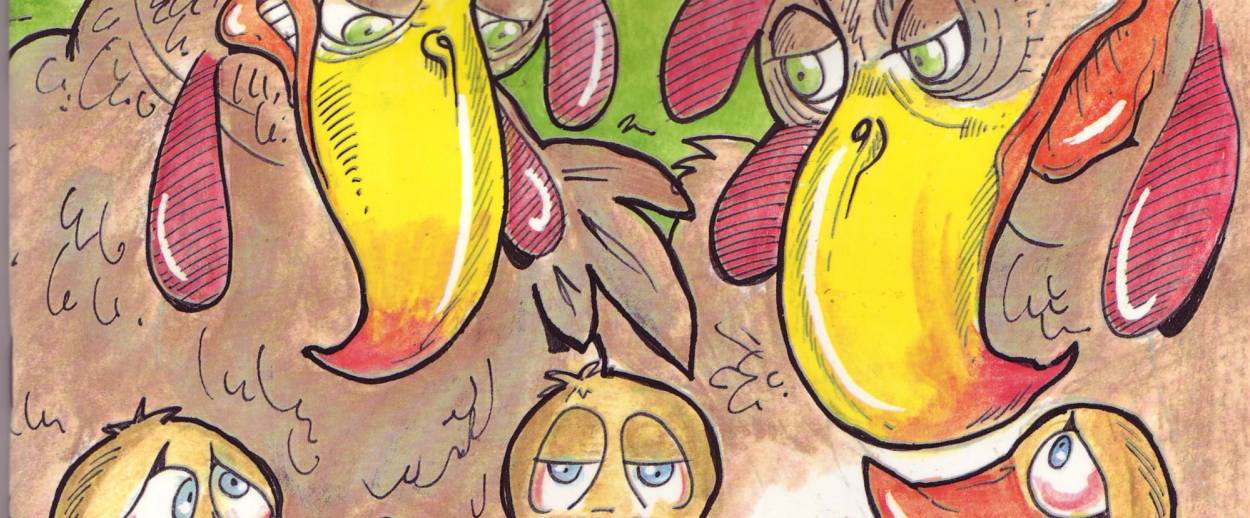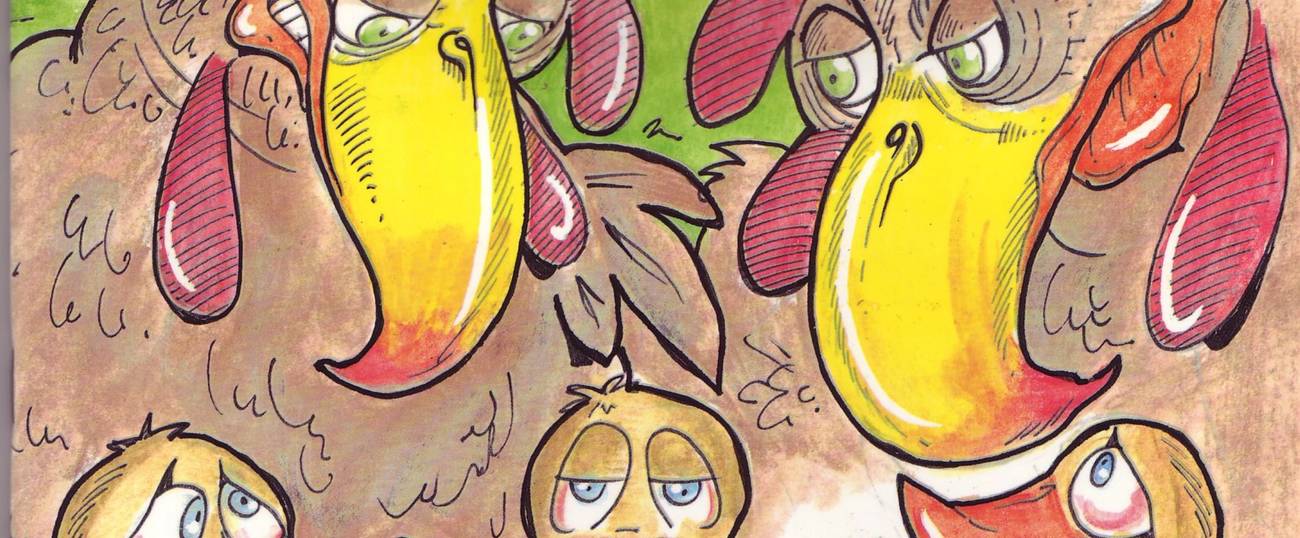The Nazi Children’s Book You Can Still Buy on Amazon: A Review
A tale of ducks, hens, and sexually voracious crows




In the wake of a 2-week-old report detailing Amazon’s sales of burning-cross onesies and children’s backpacks featuring Pepe the Frog in an SS cap, many neo-Nazi- and KKK-influenced products are no longer for sale on the site. However, you can still buy a backpack featuring Pepe the Frog as a Muslim in a turban, and you can still buy The Fable of the Ducks and the Hens, an anti-Semitic 1959 children’s book written by George Lincoln Rockwell.
Rockwell—whose career as a children’s book author began after he dropped out of college, served in the military, and cycled through careers as an artist, graphic designer, advertising executive, traveling salesman, and founder of a magazine aimed at army wives—found his purpose as the founder of the American Nazi Party. That was when he self-published this not-so-veiled rhyming parable (you know, for kids!) about sinister chickens plotting to take over the world. It is available on Amazon in both print and Kindle versions. It is also available for free all over the internet, since it seems that neo-Nazis are not fervent defenders of intellectual property. I chose the version written in Comic Sans that spells Rockwell’s name wrong. But all the versions have similar garish, caricaturish illustrations, originally credited to one Robert Edwards, that feel inflected by both old Warner Bros. cartoons and World War II anti-Jewish propaganda imagery. There are several YouTube iterations of the book as well, one uploaded by the subtly monikered “Six Million 4 Truth.”
The plot concerns itself with a happy village of ducks that is suddenly disturbed by a group of hens fleeing an unspecified atrocity.
Oh let us in! these poor birds cried,
Before we do expire!
Tis only by the merest inch
That we escaped the fire!
Their feathers burned, their combs a-droop,
They were the saddest sight.
They’d run a hundred miles or more,
All day and then all night.
The ducks, suckers all, welcome the hens. The hens regain their health, get fat, send for the roosters, and start pretending to be assimilated.
To please their hosts, these chickens tried
To waddle and to quack.
To imitate the duckish ways,
They quickly learned the knack.
Eventually the ducks ask the chickens how they’ll contribute to society. Instead of working hard, like ducks, the chickens opt “to teach and write and entertain.” Soon they’re educating the ducks’ children, inculcating them in hennish values, controlling the arts, and publishing the Duckville Daily Quack.
A group of ducklings starts refusing to swim (while standing in front of a “Refugees Welcome” sign and holding a book called Wisdom for Ducks written by “A. Hen”) because chickens don’t swim. A group of chickens starts demanding admission to the Duckville swimming pool (marked with a sign saying, “Ducks Only,” which just makes sense, after all). Burlesque shows mock the “reactionary ducks.” (Rockwell’s estranged father was a former vaudevillian and friend of Groucho Marx, Fred Allen, and Benny Goodman.) A biased chicken judge rules that the pool cannot be ducks-only. A fair-minded duck tries to write a completely balanced book about how birds should be separate but equal, but the duck printer won’t publish it because the chickens hold his mortgage and own the press. The hens plot to take over the government, secretly backing a spineless duck candidate. “This is what we do,” murmurs one grinning rooster to the others. The puppet duck wins the election. The chickens aim to start a war with Gooseville—which wisely kicked out all its refugee chickens early on—and take over Swanville.
They took a vote amongst the hens,
And every one approved!
Swanville was for hens! They said
Way back, before we moved.
The chickens bring drugs to Duckville (in the edition I read, someone has labeled the existing illustration of a building “all night rave club”).
The hens were selling loco weed
In every nasty den
But ducks who dared to mention this
Were labeled anti-hen.
The hens all preached of “Tolerance”
They invoked the “Golden Rule,”
But they subsidized the indigent
The greedy and the fool.
They pumped the swimming pond all dry
They taught the ducks to crow
While duckish numbers dwindled
The hens began to grow.
The chickens encourage miscegenation by stirring up the crows—leering, frizzy-feathered, black as pitch—to come out of the trees and get married to the ducks. (In real life, Rockwell believed that Jews were behind the Civil Rights movement, secretly plotting to cause race mixing, weaken white people, and create a distraction that would let Jews take over. “They’re just natural born agitators,” he said in a 1966 interview. “They just can’t help coming in and getting everybody all stirred up.”)
But, you ask, how does The Fable of the Ducks and Hens stand up as a work of literature? For a children’s book, it is unfashionably long. Youngsters’ attention is likely to wane. The a-b-c-b rhyme scheme gets wearying, and the meter is sometimes shaky. As befitting “a Parable of Intrigue, Propaganda & Subversion,” the characters are undifferentiated; as in any fable, characterization is shallow. Rockwell openly acknowledges that the book lacks a conclusion:
This epic really has no end because
No matter how you fight ‘em
Those hens will show up every time
And so … ad infinitum.
All this said, there are worse children’s books out there, formalistically speaking. The content is reprehensible, but the book is not the most heinous crime against literature ever committed, however much one might wish to report otherwise.
A note: While The Fable of the Ducks and Hens is a tale of good and evil writ large, Rockwell’s own life was pretty small. His second wife left him after his turn toward Nazism. His White Power indie record label, Hatenanny Records, failed. His party headquarters (a house in Arlington, Virginia) was repossessed by the IRS in 1965. In 1966, Alex Haley interviewed him for Playboy; when Rockwell immediately called him the N-word, Haley replied, “I’ve been called [that] many times, Commander, but this is the first time I’m being paid for it.” (Haley was actually paid twice. After Roots appeared on TV, Marlon Brando called the producers begging for a role in the sequel and was cast as Rockwell, interviewed by James Earl Jones as Haley — Brando won an Emmy.) In 1967, Rockwell was murdered by a former American Nazi Party member who’d been expelled for “Bolshevik leanings.” Narratively speaking, this makes a way better story than The Fable of the Ducks and Hens.
Marjorie Ingall is a former columnist for Tablet, the author of Mamaleh Knows Best, and a frequent contributor to the New York Times Book Review.